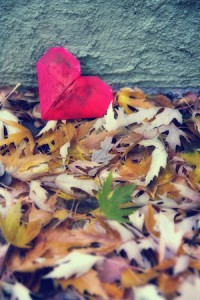 Today I walk through the world with a deep and open wound. It’s a pain that leaves me feeling both full to breaking point with a deep sadness and curiously empty. It is as if my feelings are huddled in the corner, snuggled up with Schrödinger’s Cat – simultaneously there and not there. As I returned home today I could feel my mind edging towards the source of my pain, yet recoiling as if to stare at it directly might turn me to stone. As if it would be my undoing. As if I am not strong enough to hold the grief I thought I had finally left behind.
Today I walk through the world with a deep and open wound. It’s a pain that leaves me feeling both full to breaking point with a deep sadness and curiously empty. It is as if my feelings are huddled in the corner, snuggled up with Schrödinger’s Cat – simultaneously there and not there. As I returned home today I could feel my mind edging towards the source of my pain, yet recoiling as if to stare at it directly might turn me to stone. As if it would be my undoing. As if I am not strong enough to hold the grief I thought I had finally left behind.
Today is the 23rd October. 13 years ago I found one of my closest friends dead in their flat. As full of words as I usually am, I simply don’t have the language to describe that day. The sense-memories I carry with me are as intense as ever. I can still see, smell and hear the scene as if I’m stuck in an unfinished 4D movie. Most of all, as I return to that day I can feel something I was once unaware of. As I stood in the kitchen whilst the police did their job, I felt something shatter inside of me and break into shards. Years later, it is these shards that rattle around my insides. Every so often they tear into me and remind me that I lost something I never knew I had. As strong, resilient and capable as I am, I also recognise that this grief has left me feeling lost and broken. I am not ill. I am not ‘depressed’. I am trying to accept something that I can never fully resolve. Today, the grief is with me.
When she died I had so many questions. In the early years these questions joined my voices in a chorus of accusations, guilt and pain. Even now, when the shards of grief cut me, they edge their way into my consciousness.
Why? Why did you kill yourself? Why didn’t you reach out? Could I have done or said something that would have helped? Were you in pain? Did you do it knowingly, or where you focused on seeking solace or refuge rather than death itself? Why didn’t you say goodbye? Did you leave a note for me that I never got? I replay our last conversation on a loop, yet the words are missing – lost in a medicated haze. You rang to tell me you were worried about me. Did your words contain a clue? Did you ask for help? Was I simply too sedated to hear you? Is it my fault? Did you suffer at the end?
On one level I know that these thoughts are all self-centredly ridiculous. My friend’s death was not about me. She was the one who was suffering nights of flashbacks. She was the one hiding in cupboards from the people in masks that hurt her so many years ago. I have no right to steal her pain as my own. My grief feels like a deep insult … taking the focus away from the person few now remember. Yet, I can also see myself with some compassion. I recognise that I am still grieving. The questions I hear myself asking are an understandable response to a situation that I, even with my experience of mental health, am ill equipped to understand.
In the years since her death I have tried different ways of living with this grief. In the early days, once I was able to feel again, I clung to the notion that suicide is selfish. This was spoken by the part of me that hurt the most – the part that desperately wanted to end the pain I was feeling. The part that felt unable to live. I used this belief to keep myself alive. I told myself that suicide was a way of taking the pain of one person and multiplying it amongst everyone that had ever cared for them. As much as I recognised the mind-set of desperation – when such arguments lose their logic and power – I also needed to cling to the idea that I could make a choice to live. I needed to feel that it was my responsibility to bear my own pain. The memory of finding my friend haunted me, yet it also helped me to hang on to a life that I felt unable to live. At times, it felt as if her actions had trapped me in this world. I felt angry that her death had removed an exit route I was not ready to give up on. At other times I silently recognised that her death led me to believe that life was something I needed to learn how to value. It was this that I tattooed on my neck on one anniversary of her death – a promise I made that I will never rescind.
As the years passed I began to need these beliefs less and less. Like autumn leaves, they fell away to languish alongside other stories that I have told myself to survive her death … that there was nothing I could have done … that she was a hero who battled overwhelming odds, but that she simply didn’t have a chance … that she was ill … that she was drunk … that there will be an answer to all the questions I have if only I try hard enough to understand … that I will be able to make sense of this one day and that it’ll be OK.
Now, sitting alongside my grief I am trying to confront my own personal truth. Susan died. She killed herself. I will never know what led up to her death, or understand her reasons. She is the only person who knew her full story and she is no longer here to tell it. Suicide is not selfish. It feels arrogant to judge someone who has killed themselves – arrogant because it is impossible to step inside someone’s shoes. I cannot claim her truth. I can simply find a way of living with mine. Yes, her suicide hurt me. I am in pain. It’s natural when we’re in pain to seek out an aggressor or someone to blame. Someone to take responsibility to help me make sense of all these emotions that whirl around inside me. Yet, after a while, all these attempts at sense-making ring false and incomplete. They are simply stories that have helped me keep living, for a time, with that which I cannot understand.
Instead, I am trying to accept the pain of not knowing. I am trying to find a way to welcome it. I’m trying to make friends with the tears and value the shards rattling around my soul. I am trying to live alongside it without using it as a learning opportunity or a point to campaign from. Tonight, I am simply trying to just be until it feels like I can breathe again.
13 years feels like a long time to grieve. But as Jo Twist, a poet I respect and love, said to me once …
You don’t grieve less, you just grieve less often.
Tonight, the grief is with me and it’s OK for me to not be OK with it.




Thanks for sharing, Rachel. May your pain lessen! Love & prayers, Sue Turi
Dearest Rai,
So many of our feelings are many things at once. The Schrödinger analogy is so apt. And (as is what I am coming to know as your usual) you have so many wonderful words where you think you have none. It sounds like both you and Susan were very lucky to have one another and I for having happened upon this blog.